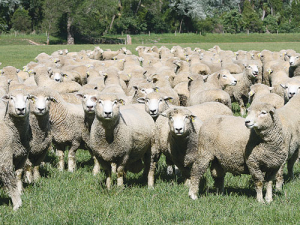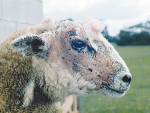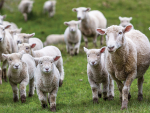Facial eczema (FE) is a seasonal scourge, but genetic selection can help minimise the impact of this production-limiting disease in sheep.
Caused by the spores of the fungus Pithomyces chartarum (which grows on litter at the base of pasture) FE affects more than just an animal’s face. The spores release a toxin which can damage the liver and bile ducts. In some cases, the bile ducts may become partly or completely blocked. The liver damage results in photosensitivity and sunburn which are the clinical signs of the disease.
The fungus is everywhere, but when temperature and moisture levels are high the fungus grows rapidly, releasing huge numbers of toxic spores.
For every animal with clinical signs of FE – which are obvious skin lesions – there will be many more with sub-clinical disease. This includes the invisible ongoing liver damage that can cause major productivity losses, especially at mating, lambing and calving.
Genetic tolerance offers the best protection against the disease and many breeders have been testing rams for many years now.
When selecting rams, commercial farmers (who want to include FE tolerance in their trait selection) should ask their breeder how long he or she has been testing rams, the level they are testing at, the number of rams they test every year and ask to see the Ramguard certificates.
Ramguard is the AgResearch-managed organisation that carries out the FE tolerance testing.
Breeders serious about breeding for FE tolerance should be testing at least 10% of their sale rams every year and only using tested rams in their stud.
King Country farmer Russell Proffit is a Perendale breeder and chair of FE Gold. This represents ram breeders who have been tolerance testing for FE for many years. The group is now testing at the highest possible dose rate of 0.6mg/kg (this is where the animal is dosed with the toxin and blood tests assessing liver damage measure how tolerant the ram is to the FE causing toxin).
Proffit says that it can take 20 years to breed to a high degree of FE tolerance. Breeders start at zero and gradually build up to an optimum dose rate of 0.6 – which is where the leading FE tolerant Romney and Coopworth breeders are.
While it takes decades for stud breeders to breed FE tolerance into their flocks, commercial farmers can get there a lot faster by selecting rams from these breeders.
Proffit believes it is important to ask the correct questions when buying genetics. He says commercial farmers should be cautious about buying rams from clearing sales where the claim has been made that they are FE tolerant.
To find a list of breeders that are selecting for FE tolerance, look up the Sheep Improvement Ltd (SIL) website to see the up-to-date Ramguard list: https://www.sil.co.nz/tools/flocks-focussed-on-health-traits#drop4



















